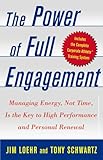If you have a tendency to work too much (or not enough!), I highly recommend The Power of Full Engagement: Managing Energy, Not Time, is the Key to High Performance and Personal Renewal. I’ve been dipping into it a bit and, while parts of it can seem like too much of a step-by-step program (for lack of a better term) at times, it has a lot of helpful insight.
Here are a few quotes:
“Managing time efficiently is no guarantee that we will bring sufficient energy to whatever we are doing” (4).
“The performance demands that most people face in their everyday work environments dwarf those of any professional athletes we have every trained” (8).
“Sadly, the need for recovery is often viewed as evidence of weakness rather than as an integral aspect of sustained performance” (12).
Maximum performance comes by “alternating periods of activity with periods of rest” (28).
“Nearly every elite athlete we have worked with over the years has come to us with performance problems that could be traced to an imbalance between the expenditure and the recovery of energy. They were either overtraining or undertraining in one or more dimensions — physically, emotionally, mentally or spiritually. Both overtraining and undertraining have performance consequences that include persistent injuries and sickness, anxiety, negativey and anger, difficulty concentrating, and loss of pasion. We achieved our breakthroughs with athletes by helping them to more skillfully manage energy — pushing themselves to systematically increase capacity in whatever dimension it was insufficient, but also to build in regular recovery as part of their training regimens. Balancing stress and recovery is critical not just in competitive sports, but also in managing energy in all facets of our lives. When we expend energy, we draw down our reservoir. When we recover energy, we fill it back up. Too much energy expenditure without sufficient recovery eventually leads to burnout and breakdown. (Overuse it and lose it.) Too much recovery without sufficient stress leads to atrophy and weakness. (Use it or lose it.)” (29)
“To the degree that leaders and managers build cultures around continuous work…performance is necessarily compromised over time. Cultures that encourage people to seek intermittent renewal not only inspire greater commitment, but also more productivity” (30).
“You can always find reasons to work. There will always be one more thing to do, but when people don’t take time out, they stop being productive” (35).
“When we operate at a high enough intensity for long enough, we progressively lose the capacity to shift to another gear” (39).
By advocating that we don’t overwork, however, they aren’t arguing that we coast. Rather, the periods of activity should often push us beyond our limits. The key is that you also have to punctuate these times with sufficient periods of rest and recovery. Here’s a good overall summary of that point, which is one of the key points of the book:
“When we first suggested to Roger B. that he lacked sufficient capacity in part because he hadn’t exposed himself to sufficient stress, he was incredulous. ‘My life is more stressful than ever,’ he insisted. ‘I’m getting less help from my boss, and I’ve got more people to supervise, fewer resources and more competition. If what you’re saying is right, how come I’m not getting stronger?’ Many of our clients initially raise the same question.
“The answer, we tell them, is that the key to expanding capacity is both to push beyond one’s ordinary limits and to regularly seek recover, which is when growth actually occurs [this is just like with weight training, or running, or swimming, and so forth]. There was no area of Roger’s life in which he was doing both. At the physical and spiritual level, he wasn’t spending enough energy to build capacity. Because he was undertraining those muscles, they continued to atrophy.
“In the other two dimensions — mental and emotional — Roger was overtraining, subjecting himself to excessive stress without sufficient intermittent recovery. The result was that he felt overwhelmed. His solution was simply to keep pushing. What he needed was time to detoxify and change channels in order to periodically renew mentally and emotionally. Roger was pushing himself too hard in some dimensions and not hard enough in others. The ultimate consequence was the same: diminished capacity in the face of rising demand.
